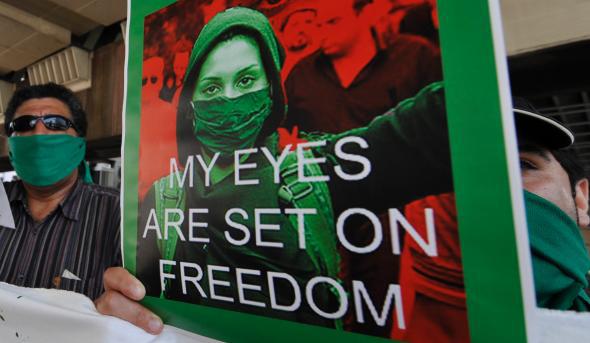The State Department finally released its annual “Country Reports on Human Rights Practices” today—a much-cited global roundup of human rights developments in the previous year. The congressionally mandated report was technically required to come out on Feb. 25, but was delayed until April, and then until now, because of—according to the department, anyway—scheduling conflicts for Secretary of State John Kerry.
Critics didn’t really buy that explanation, charging that the administration was trying to avoid criticizing Iran during the sensitive ongoing nuclear talks. In a recent op-ed, Sen. Ted Cruz called the delay “unacceptable” and threatened to draft legislation fining the State Department 5 percent of its budget for every 30 days the report was delayed.
Whatever the reason for the delay, the report that was released today, just five days before the (likely to be missed) negotiation deadline, hardly goes easy on Iran. It accuses the Islamic Republic of “severe restrictions on civil liberties, including the freedoms of assembly, speech, religion, and press; limitations on the citizens’ ability to change the government peacefully through free and fair elections; and disregard for the physical integrity of persons, whom authorities arbitrarily and unlawfully detained, tortured, or killed.” Crackdowns on political activists and discrimination and violence against women, ethnic minorities, and LGBT people are also documented.
The Cuban government, target of the administration’s other major ongoing effort at diplomatic outreach, also comes under criticism for “the abridgement of the ability of citizens to change the government and the use of government threats, extrajudicial physical assault, intimidation, violent government-organized counter-protests against peaceful dissent, and harassment and detentions to prevent free expression and peaceful assembly.”
Current U.S. allies receive criticism as well. The U.S. recently resumed military aid to Egypt that had been suspended after the 2013 coup that overthrew President Mohamed Morsi. The move came despite a hardly improved human rights situation, which, according to the new report, includes “unlawful killings and torture; the suppression of civil liberties and limitations on due process in trials.”
Saudi Arabia, the longtime U.S. ally that Obama visited along with a large group of senior advisers earlier this year in order to pay condolences to its late king, is noted for discrimination and violence against women, marginalization of minorities, the harsh punishments meted out to critics like blogger Raif Badawi, and the sentences of execution by beheading inflicted on individuals “for crimes such as drug smuggling and sorcery.”
The section on Israel and the Occupied Territories is pretty mild compared with what we’ve recently seen from the United Nations, but while the report does focus more heavily on abuses by Hamas and the Palestinian Authority, Israel is criticized for “excessive use of force against civilians,” the abuse of detainees, and violence by settlers in the West Bank.
As for America’s allies against ISIS: Iraqi security forces are criticized for extrajudicial killings and the torture of detainees, and the Shiite militias who have been among the most effective fighters against the group are noted for violence against Sunni civilians including kidnappings, torture, and the mass destruction of property. Still, the report, using the U.S. government’s preferred acronym, states that “ISIL committed the overwhelming number of serious human rights abuses.”
This is in keeping with the report’s introduction, which argues that “while our reports continue to focus on the behavior of governments—which bear responsibility for the promotion and protection of human rights and fundamental freedoms in their territories—the year 2014 will be remembered as much for atrocities committed by non-state actors.”
